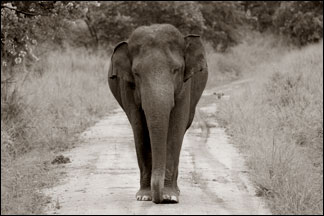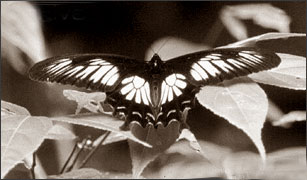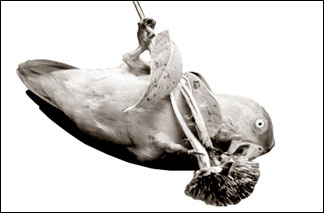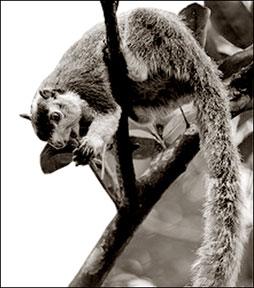Trade convention to save endangered species?
by Sajitha PREMATUNGE
 |
| Asian Elephant |

Sri Lanka Rose |
 |
| Hanging Parrot |

Giant Squirrel |
It would be surprising if a convention on 'trade' could save species
from the brink of extinction. But CITES has done this for many
endangered species in many countries around the world. Its aim is to
prevent trade from threatening the existence of wild flora and fauna,
ranging from wild animals to the trade of animal parts. But for a people
of a country which boasts of the world's first Customs Biodiversity
Unit, it is doubtful that anyone - who is not familiar with wildlife
conservation - in Sri Lanka would know what CITES is. On the other hand
a citizen of any other CITES signatory nation would know that CITES
stand for - Convention on International Trade in Endangered Species of
Wild Life and Flora.
The World Customs Organization has declared the coming year as the
CITES year as of January 26, 2009 - the International Customs Day. He
aspires to make customs an environment that protects the natural
heritage of a nation. CITES consists of a secretariat made of two
committees - flora and fauna, Enforcement body and Scientific and
Management Authorities. The Enforcement body of CITES in Sri Lanka is
Customs through the World Customs Organisation, unlike the police
through Interpol in other signatory countries. CITES has 173 CITES
member parties to date. "CITES is so familiar to these countries that
endangered species are simply referred to as CITES species." said Chief
Preventive Officer of Customs, Samantha Gunasekara.
With the announcement of the Director General, Sri Lanka Customs is
planning to have a full-fledged awareness campaign from January 15 to
20. "This awareness campaign will be conducted in the harbour, airport,
parcel post examination points and container yards." said Samantha
Gunasekara. "We were the pioneers of the 'Green Customs Concept' - the
focus on the environment, involving the enforcement of Multilateral
Environmental Agreements, on imports and exports, through customs." But
as he explains, CITES is not very strong in Sri Lanka. Apart from the
lack of an independent Scientific Authority, enforcement of law
regarding CITES is another major reason. "CITES was ratified in 1973 and
Sri Lanka became a signatory in 1979. But regulations regarding the
Convention have not been properly formulated as yet."
Plants and animals are being traded in increasing numbers every year
and the trade of endangered species cannot be stopped through FFPO
(Flora and Fauna Protection Ordinance). While CITES protects species
threatened with extinction it also prevents species from being
threatened with extinction in the future. Today more than 30,000 species
of flora and fauna are protected under CITES. Because trade, most often,
takes place between countries, international cooperation is essential
for the conservation of such species. In this sense the importance of
CITES as a strong legal base could not be further stressed, from which
Sri Lanka could reap huge benefits.Samantha Gunasekara explained that
the training opportunities brought forth by CITES is immense and it
permits the perusal of all export data. He pointed out that some
countries do not accept shipments of animals or animal products without
the relevant CITES permits. "CITES can control trade of endangered
species like no other convention, because it's a trade convention." He
emphasised that CITES regulations should be adopted differently by each
country, facilitating legal breeding and trade of species, while also
controlling the trade of endangered species. Sri Lanka Customs issue
export permits to horticulturists for species like Bandura and breeders
for fauna such as Sea horse, protected under CITES. But as Samantha
Gunasekara explained, because of the lack of regulations even this
perfectly legal practice - which other countries make maximum use of -
encounters a lot of obstacles. "If CITES was strong here in Sri Lanka
most of these problems could have easily been dealt with", said Samantha
Gunasekara. |
